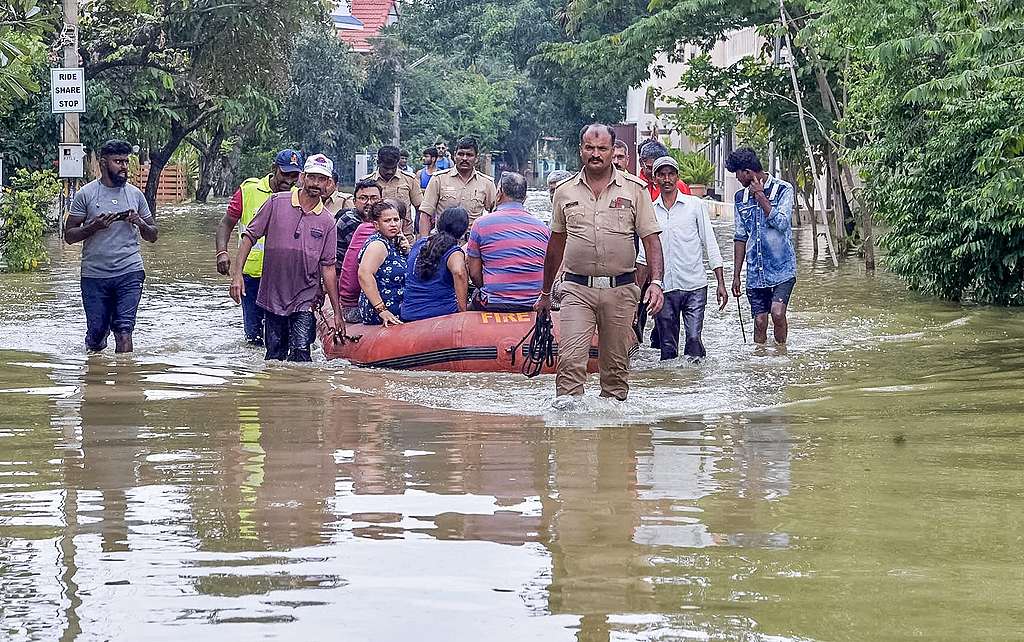
Bengaluru, 26th Sept 2022. Greenpeace India has written an Open Letter to the Chief Minister of Karnataka to urge the administration to look at long-term, equitable solutions to congestion and flooding in the backdrop of the rains and subsequent waterlogging in Bengaluru that has caused massive losses to the city and its citizens. The letter particularly addresses the issue of public mobility in the age of climate disasters and invites citizens to speak about their experiences and localised solutions to the crisis.
Bengaluru faces a pressing challenge, and the city’s response is lacking. The unprecedented rapid flooding in Bengaluru during the early weeks of September inundated 2,000 houses and damaged 22,000 vehicles, according to official statistics. However, the hardships and damages faced by hundreds of marginalised communities, many of whom lost their livelihoods and homes, is yet to be accounted for. In the midst of this crisis, projections suggest that rainfall in India will become more incessant and erratic leading to floods with a 20 percent surge in extreme rainfall related events, according to the IPCC Report 2022.
The government’s recent announcement of building elevated highways is a carbon-intensive, unsustainable and non- inclusive mobility solution, which at best may address the traffic challenge for a short time period. Such policies will worsen the climate crisis as well as endanger/ignore the city’s bus-based transportation (which supports the largest daily travel share), non-motorised transport-based solutions (such as cycling and walking) and last-mile connectivity solutions. Data from the 2011 Census shows that Bengaluru’s population density rose by a whopping 47% in the preceding decade, and limiting solutions to more roads is unscientific, inequitable and unsustainable.
Avinash Kumar Chanchal, Campaign Manager at Greenpeace India, says, “The impact of climate change is becoming more visible than ever. Extreme weather events such as floods, unprecedented rains and heatwaves are increasing in intensity, frequency and severity across Indian cities. The recent floods in Bengaluru reveal both the severity of extreme weather events and also expose the city’s ill preparedness to deal with such events. It is time we build climate resilient cities . It is also critical that the state government not use this crisis to build more flyovers or elevated corridors which are not only unsustainable, but also counterproductive to the city and the citizens. The need of the hour is to build socially beneficial infrastructure and more equitable allocation of road space and public transport to people, rather than private vehicles”.
Greenpeace India demands the following actions from the city’s stakeholders:
1. The government must cease plans to construct the proposed three-layer highways owing to their unsustainability and limited purpose. In lieu of the new highways which are limited to being car-centric, the government must reinvest and focus on its public road transportation system.
2. ITeS, BPO and other companies and tech parks in Bengaluru should be encouraged to adopt flexible work policies. The companies should incentivise working professionals who commute to work by cycles and by means of public road transportation.
3. The Karnataka state and local governments should provide adequate funding and support to implement localised climate action plans with a clear timeline and in close consultation with citizens.
4. The government as well as citizens should conserve, revive and protect Karnataka’s natural resources (such as water bodies, tree cover etc.) to help maintain its sensitive ecosystem of flora and fauna and build on its nature-based resilience capacity.
For more information, contact:
Avinash Chanchal
[email protected]
+91 8882153664
Nischita Verrendra
[email protected]
+91 9845828096
